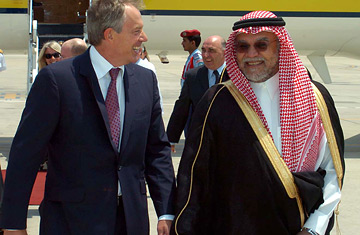
Pressure mounted to reopen the criminal investigation into secret payments by arms company BAE to Saudi, while Prince Bandar was the man named as attempting to pervent the course of justice.
For the British government, a dressing down from the judiciary can hardly come much rougher. The High Court in London, in a damning rebuke of ex-Prime Minister Tony Blair's administration, ruled Thursday that the government's own Serious Fraud Office (SFO) broke the law in 2006 when it scrapped a corruption probe into arms deals between BAE Systems, Britain's biggest defense firm, and Saudi Arabia.
The judgment, handed down by Lord Justice Moses and Justice Sullivan, censured Robert Wardle, director of the SFO, for allowing threats made by Saudi officials to scupper the probe into allegations of bribery. The Blair government called a halt to that investigation in December 2006, a decision it insisted was made purely in the interest of national security. The court was scathingly unconvinced. "No one, whether within this country or outside, is entitled to interfere with the course of our justice," the judges ruled. "It is the failure of Government and [Wardle] to bear that essential principle in mind that justifies the intervention of this court."
The SFO's probe, begun in July 2004, focused on the alleged payment of bribes by BAE in connection with its $60 billion "Al-Yamamah" arms deal agreed with Saudi Arabia in the mid-'80s. According to the High Court judgment, BAE sought in late 2005 to persuade Lord Goldsmith, then Britain's Attorney General, to call a halt to the inquiry, claiming it would sour relations between the U.K. and Saudi Arabia, and endanger future lucrative arms deals.
When both the Attorney General and the SFO's Wardle resisted BAE's request for lenience, the Saudis turned up the heat. In 2006, the judgment states, Prince Bandar bin Sultan, the former Saudi Ambassador to Washington, warned Jonathan Powell, Tony Blair's then-chief of staff, to shelve the investigation. Failure to do so, the Prince threatened, would weaken intelligence cooperation and wreck a $40 billion deal for BAE to supply Eurofighter Typhoon jets to the Saudis. Soon after government ministers made Wardle aware of the threat, the SFO's boss agreed to drop the case. "The Director was required to satisfy the court that all that could reasonably be done had been done to resist the threat," the judges said. "He has failed to do so." Both BAE and Prince Bandar — who is himself alleged to have received some $2 billion in payments connected with the al-Yamamah deal — have consistently denied any wrongdoing.
The ruling marked a "genuinely good day for British justice," says Susan Hawley of NGO The Corner House, one of two pressure groups to have brought the case before the High Court. More could follow. In the next few weeks, the court is expected to force the SFO to reevaluate its decision to scrap the probe, amid mounting pressure for it to revive the investigation. Right now, the SFO is "carefully considering the implications of the judgment and the way forward," a spokesman said. Lawyers acting for the pressure groups expect the government to appeal the ruling. Meanwhile, U.S. Department of Justice and Swiss authorities are continuing their own corruption probes into the arms deal.
